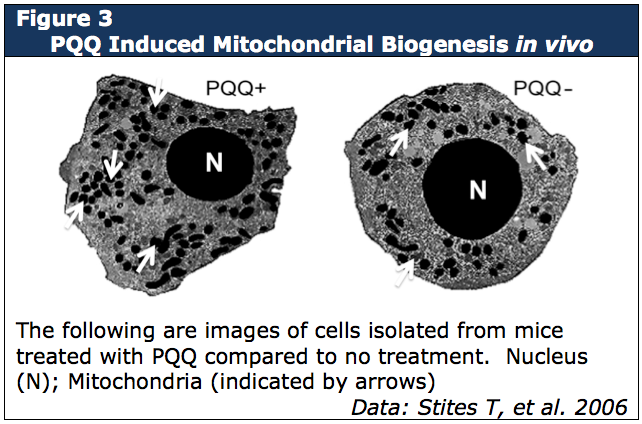 It’s 3 o’clock on a Monday afternoon and somehow even though you’re on your third cup of coffee, you just don’t seem to have the energy to get through the day! Maybe you didn’t get enough sleep the night before? Could it be the case of the Mondays? Do you need another cup of coffee? Granted these may be viable explanations and temporary solutions, but none provide a more long-term solution for lack of energy. On the other hand, PQQ has actually been shown to significantly improve long-term energy utilization by aiding in mitochondrial creation and function26-31.
It’s 3 o’clock on a Monday afternoon and somehow even though you’re on your third cup of coffee, you just don’t seem to have the energy to get through the day! Maybe you didn’t get enough sleep the night before? Could it be the case of the Mondays? Do you need another cup of coffee? Granted these may be viable explanations and temporary solutions, but none provide a more long-term solution for lack of energy. On the other hand, PQQ has actually been shown to significantly improve long-term energy utilization by aiding in mitochondrial creation and function26-31.
The mitochondria are the “powerhouse” of the cell. These subcellular organelles play a large role in metabolism and provide energy for your body to use in the form of Adenosine Triphosphate (ATP). Mitochondria exist throughout your body, from the neurons in your brain to the cells in your muscles to even your immune cells! PQQ has been shown to be vital for optimal mitochondrial function and participates in optimizing energy use.
A groundbreaking clinical study conducted by scientists from University of California Davis (UC Davis) showed that PQQ helps drive efficient energy usage of the mitochondria in humans by decreasing oxidative byproducts and metabolites6. They further found that PQQ enhanced mitochondria-related functions in participants, resulting in reduced inflammation6.
In addition to improving mitochondrial function, PQQ is also responsible in the process of making more mitochondria for increased energy production, called mitochondrial biogenesis31,32. Chowanadisai and colleagues famously elucidated the causal mechanism by which PQQ increases mitochondria production and function32. They showed that PQQ increases mitochondria production through increased expression of an important protein factor called PGC-1α, which has been known to directly increase mitochondria biogenesis. By increasing number of mitochondria, PQQ offers a more robust and reliable means of increasing energy potential for our bodies. This sentiment was further emphasized in a study where scientists provided proof-of-concept data that PQQ causes increased mitochondrial biogenesis in pre-clinical models33. The study showed that as little as a few micrograms of PQQ supplemented in the diets of mice lead to a significant increase in mitochondria production as well as increased energy utilization (Figure 3)33. Because of the ubiquitous presence of the mitochondria in providing energy to multiple systems in our body, we can truly appreciate what an important role PQQ takes in helping us maintain energy.






